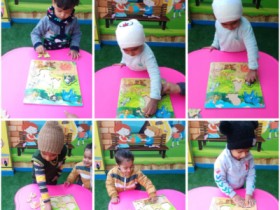In the vibrant tapestry of early childhood education, play-based learning stands out as a crucial and transformative approach. Far more than just a pastime, play is a dynamic vehicle for holistic development, laying the foundation for a child's cognitive, social and emotional growth.
Understanding Play-Based Learning:
Play-based learning is an educational philosophy that recognizes play as the primary medium through which children make sense of the world around them. Through play, children engage with their environment, experiment with ideas and develop essential skills that form the building blocks for future academic success.
Cognitive Development:
Play-based learning stimulates cognitive development by encouraging curiosity, problem-solving and imagination. Whether it's stacking blocks, solving puzzles or engaging in pretend play, children are actively constructing their understanding of concepts such as size, shape and cause-and-effect. These playful interactions lay the groundwork for more complex cognitive processes later in life.
Social Skills and Emotional Intelligence:
One of the remarkable aspects of play-based learning is its inherent ability to nurture social skills and emotional intelligence. In group play scenarios, children learn cooperation, negotiation and empathy. The give-and-take nature of play teaches them to navigate relationships, resolve conflicts and develop a sense of self-awareness, fostering emotional resilience.
Language Development:
Play serves as a powerful medium for language development. Whether engaging in storytelling, participating in make-believe play or collaborating on a creative project, children are exposed to a rich vocabulary and learn the nuances of communication. Play-based activities provide a natural context for language acquisition, helping children express themselves with confidence.
Physical Well-being:
Play is synonymous with movement and physical activity is integral to a child's overall well-being. Activities such as outdoor play, games and sports not only contribute to the development of gross motor skills but also instill healthy habits from an early age. Play-based learning ensures that children associate physical activity with joy and enjoyment.
Implementing Play-Based Learning:
Parents and educators play a pivotal role in facilitating play-based learning experiences. Creating an environment that encourages exploration, providing open-ended materials and allowing unstructured playtime are essential elements. Balancing guided activities with free play allows children to discover their interests and strengths organically.
In the realm of early childhood education, play-based learning emerges as a cornerstone, fostering a love for learning that extends far beyond the classroom. Recognizing the profound impact of play on cognitive, social and emotional development empowers parents and educators to embrace and champion this dynamic approach. Let us celebrate the boundless potential that unfolds when children are given the space to play, explore and create – for in these moments, the seeds of brilliance are sown.

